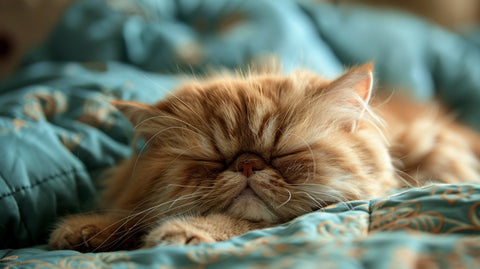Introduction
Cats are notorious for their sensitive stomachs, and it's not uncommon for them to vomit after eating. While occasional vomiting might not be a cause for concern, frequent or persistent episodes could indicate an underlying issue. Understanding the reasons behind why your cat vomits after eating can help you address the problem effectively.
Common Causes of Cat Vomiting
Hairballs
One of the most common reasons for cat vomiting is the formation of hairballs. Cats groom themselves by licking their fur, which can lead to the ingestion of loose hair. When this hair accumulates in the stomach, it can form into a ball that is then vomited up.
Dietary Issues
Certain ingredients or types of food may not agree with your cat's stomach, leading to vomiting. Abrupt changes in diet or consuming spoiled food can also trigger digestive upset in cats.
Allergies
Just like humans, cats can develop allergies to certain foods or environmental factors. If your cat is allergic to something in their diet, it can result in vomiting as their body tries to expel the offending substance.
Eating Too Quickly
Some cats have a habit of eating too quickly, which can cause them to swallow air along with their food. This can lead to vomiting shortly after eating.

When to Be Concerned
While occasional vomiting may be normal for cats, there are certain signs that indicate you should seek veterinary care.
Frequency of Vomiting
If your cat is vomiting frequently, such as several times a day or multiple days in a row, it could indicate an underlying health issue that needs to be addressed.
Additional Symptoms
Pay attention to any other symptoms accompanying the vomiting, such as diarrhoea, lethargy, or loss of appetite. These could be signs of a more serious condition.
Preventing Cat Vomiting
Regular Grooming
Help prevent hairballs by regularly grooming your cat, especially if they have long fur. Brushing helps remove loose hair before it can be ingested.
Proper Diet
Ensure your cat is eating a balanced diet that is appropriate for their age, breed, and health status. Avoid sudden changes in food and opt for high-quality, easily digestible options.
Slow Feeding Methods
If your cat tends to eat too quickly, consider using puzzle feeders or slow feeder bowls to encourage slower eating and reduce the likelihood of vomiting.
Food Allergy Testing
If you suspect your cat's vomiting is due to a food allergy, consult with your veterinarian about allergy testing and potential dietary changes.
Home Remedies for Cat Vomiting
Hairball Remedies
Hairballs are a common issue among cats, but there are effective remedies to help manage them. Consider incorporating specialised diets formulated to promote hairball control. These diets typically contain higher fibre content to aid in the passage of hair through the digestive system.
Additionally, oral lubricants or gels can be administered to your cat to help facilitate the expulsion of hairballs. These products work by coating the hairball, making it easier for your cat to eliminate through vomiting or passing it in their stool. Regular use of these remedies can significantly reduce the frequency of hairballs and promote digestive health in your feline companion.
Dietary Changes
Finding the right diet for your cat is crucial in managing digestive issues and reducing vomiting. Experiment with different types of cat food, including wet and dry varieties, to determine which one agrees best with your cat's stomach. Look for high-quality cat food brands that use natural, easily digestible ingredients. Consider opting for grain-free or limited ingredient diets if your cat has food sensitivities or allergies. Introduce dietary changes gradually to allow your cat's digestive system to adjust.
Monitoring your cat's response to different foods can help identify triggers for vomiting and enable you to tailor their diet accordingly for optimal digestive health.
Home-cooked Meals
Preparing homemade meals for your cat can be a nutritious and beneficial option, especially if commercial cat food options don't suit their needs. When cooking for your cat, focus on using simple, wholesome ingredients that are safe and easily digestible. Lean proteins such as chicken, turkey, or fish can serve as the foundation of their meals, supplemented with cooked vegetables like carrots or green beans. Avoid seasoning the food with spices or additives that could upset your cat's stomach.
Incorporating homemade meals into your cat's diet provides greater control over ingredients and allows you to tailor the food to meet their specific dietary requirements. Always consult with your veterinarian before making significant changes to your cat's diet to ensure it meets their nutritional needs.
When to Seek Veterinary Care
Persistent Vomiting
Persistent vomiting in cats can indicate an underlying health issue that requires veterinary attention. If your cat continues to vomit despite trying home remedies or if the vomiting becomes more frequent or severe, it's essential to seek professional veterinary care promptly. Your veterinarian can perform a thorough examination to determine the cause of the vomiting and recommend appropriate treatment. Ignoring persistent vomiting can lead to dehydration, electrolyte imbalances, and further complications, so it's crucial not to delay seeking medical help for your cat's well-being.
Blood in Vomit
The presence of blood in your cat's vomit is a concerning sign that should never be ignored. Blood in vomit can indicate various serious conditions, including gastrointestinal ulcers, internal injuries, or bleeding disorders. If you notice blood in your cat's vomit, it's imperative to seek immediate veterinary attention. Your veterinarian will conduct diagnostic tests, such as blood work and imaging studies, to determine the underlying cause of the bleeding. Prompt intervention is essential to prevent further complications and ensure the best possible outcome for your cat's health.
Lethargy or Weakness
If your cat is vomiting and also displaying signs of lethargy, weakness, or dehydration, it's essential to act quickly and consult with a veterinarian. Lethargy and weakness can be symptoms of a wide range of underlying health issues, including infections, organ dysfunction, or metabolic disorders. Dehydration can exacerbate these symptoms and pose a serious risk to your cat's health. Your veterinarian will assess your cat's condition, provide supportive care such as fluid therapy if necessary, and determine the underlying cause of their symptoms. Early intervention is crucial in addressing health problems effectively and ensuring the best possible outcome for your cat's recovery.
Conclusion
While occasional vomiting may be normal for cats, frequent or persistent episodes could indicate an underlying health issue that needs to be addressed. By understanding the common causes of cat vomiting and knowing when to seek veterinary care, you can help keep your feline friend happy and healthy.
FAQs
-
Can stress cause my cat to vomit?
- Yes, stress or anxiety can sometimes lead to digestive upset and vomiting in cats.
-
Should I withhold food if my cat is vomiting?
- It's generally recommended to withhold food for 12-24 hours if your cat is vomiting, but always consult with your veterinarian for specific advice based on your cat's health.
-
Is it normal for my cat to vomit hairballs?
- Occasional vomiting of hairballs is considered normal for cats, but frequent or persistent vomiting may indicate an issue that needs to be addressed.
-
What should I do if my cat vomits frequently?
- If your cat is vomiting frequently, it's important to consult with your veterinarian to determine the underlying cause and appropriate treatment.
-
Can I give my cat human medications for vomiting?
- No, it's never safe to give your cat medications intended for humans without consulting with a veterinarian first. Some human medications can be toxic to cats and may worsen their condition.
Discover the Power of Cooper and Gracie for Your Pet's Well-being
At Cooper and Gracie, we understand the deep bond between you and your furry friend. That's why we're dedicated to providing the highest quality cat products to enhance your pet's well-being and happiness. With our range of premium grooming essentials, natural supplements, and effective remedies, you can ensure that your pet receives the care they deserve. Whether you're looking to tackle pesky hairballs, soothe sensitive skin, or simply pamper your pet, we've got you covered. Join the countless pet owners who trust Cooper and Gracie to keep their beloved companions healthy and thriving. Experience the difference for yourself and discover why we're the go-to choice for pet care. Shop now and give your pet the gift of health and happiness with Cooper and Gracie.

